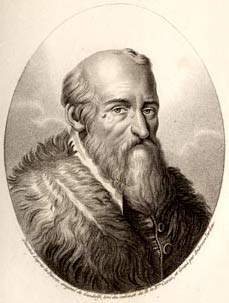| Ulisse Aldrovandi  Born: 11-Sep-1522 Born: 11-Sep-1522
Birthplace: Bologna, Italy
Died: 10-Mar-1605
Location of death: Bologna, Italy
Cause of death: unspecified
Gender: Male
Religion: Roman Catholic
Race or Ethnicity: White
Occupation: Naturalist Nationality: Italy
Executive summary: Pioneering entomologist and naturalist Italian naturalist, was born of noble parentage at Bologna on the 11th of September 1522. He was apprenticed to a merchant in Brescia, but a commercial career being distasteful to him, he turned his attention to law and medicine, studying first in his native town and afterwards at Padua. In 1550 he was accused of heresy, but succeeded in clearing himself before the Inquisition. In 1553 he took his doctor's degree in medicine at Bologna, and in the following year was appointed professor of philosophy and also lecturer on botany at the university. In 1560 he was transferred to the chair of natural history. At his instance the senate of Bologna established in 1568 a botanical garden, of which he was appointed the first director. About the same time he became inspector of drugs, and in that capacity published in 1574 a work entitled Antidotarii Bononiensis Epitome, which formed the model for many subsequent pharmacopoeias. He was also instrumental in founding the public museum of Bologna, which contains, especially in the natural history department, a large number of specimens collected by him. The results of his various researches were embodied in a magnum opus, which was designed to include everything that was known about natural history. The first three volumes, comprising his ornithology, were published in 1599, and a fourth, treating of insects, appeared in 1602. After his death a number of other volumes were compiled from his manuscript materials, under the editorship of several of his pupils, to whom the task was entrusted by the senate of Bologna. The work was enriched by a large number of illustrations prepared at great expense, the author having, it is said, employed several celebrated artists for thirty years. Among these were Lorenzo Benini of Florence and Christopher Coriolanus of Nuremberg. It has been said, indeed, that the cost of the undertaking was so great as to exhaust its author's means, and that he died penniless and blind in the public hospital of Bologna. This, however, is probably incorrect, at least as regards the allegation of poverty. Published records of the senate of Bologna show that it liberally supported Aldrovandi in his undertaking, doubling his salary soon after his appointment as professor, and bestowing on him from time to time sums amounting in all to 40,000 crowns. If, therefore, he died in the public hospital, he probably went there for the better treatment of his disease. His death occurred on the 10th of May 1605. Aldrovandi was chiefly remarkable for laborious and patient research. He seems to have been totally destitute of the critical faculty, and hardly any attempt is made in his great work to classify facts or to distinguish between the true and the fabulous, the important and the trivial. Much is thus included that is of no scientific value, but it also contains much information of very great interest to the naturalist. Heresy
Do you know something we don't?
Submit a correction or make a comment about this profile
Copyright ©2019 Soylent Communications
|